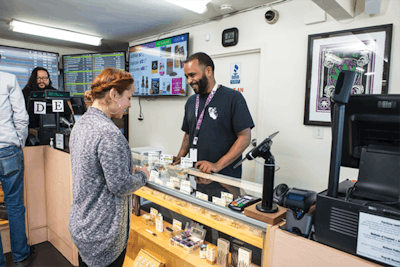
This article originally appeared in the April 2018 issue of Cannabis Dispensary. To subscribe, click here.
Berkeley Patients Group (BPG) has been around a long time. Think of it this way: If the California medical dispensary was a person, it would be of age to legally obtain a medical card. Opening its doors in 1999, BPG is now in its 19th year of serving the Bay Area, making it the nation’s oldest medical cannabis dispensary.
In those nearly two decades, BPG has become an industry stalwart, if not the model example, for corporate social responsibility (CSR). In addition to providing free medicine and ancillary wellness services to its patients in need, BPG also donates time and money to many local organizations. (Its website lists 18 organizations and notes they are “just a few” of the ones it contributes to.) Giving on such a grandiose scale has allowed the dispensary to become a community pillar and garner overwhelming resident support.
As the cannabis industry continues to weave itself into the fabric of American society, many dispensary owners recognize CSR and philanthropic efforts as the industry’s conduit to mainstream acceptance and legitimacy. Here, Steve Brooks, CEO of Denver-based Lightshade (a vertically integrated cannabis company), talks with BPG’s co-owner and vice president, Etienne Fontan, about recent changes to Berkeley’s cannabis regulations, BPG’s commitment to CSR (and why it takes it so seriously), ways dispensaries can get involved in their communities and more.
Steve Brooks: How are things going out there in California so far?
Etienne Fontan: Going good, [but] not without its own set of challenges. We just passed in our city council [the declaration of] Berkeley [as] a “sanctuary city” for cannabis, as well as lowering the city tax from 10 percent to 5 percent to make [the city of Berkeley] more competitive. [Editor’s note: As a “sanctuary city,” Berkeley prohibits its “agencies and employees from using city resources to assist in enforcing federal marijuana laws or providing information on legal cannabis activities,” as explained by the Los Angeles Times.]
The taxes impact us on different levels. A 10-percent city tax in Berkeley affects every line in the supply chain. It's a 10-percent tax for the grower, 10-percent tax for the wholesaler, 10-percent tax for testing, then a 10-percent tax at the retail level. So, it turned out to be a 40-percent tax in Berkeley. … They're also looking at removing the tax regarding
We're dealing with the challenges of the newer California regulations. We're operating currently under the emergency regulations and not the permanent regulations. So, constantly being active is one of those realities that have led [Berkeley] to be leaders in the industry, as well as around the Bay Area, because what our city council did will be reflected in other cities across California.
To read the full article in Cannabis Dispensary's February 2018 issue, click here.
Top photo by Mark Madeo


























